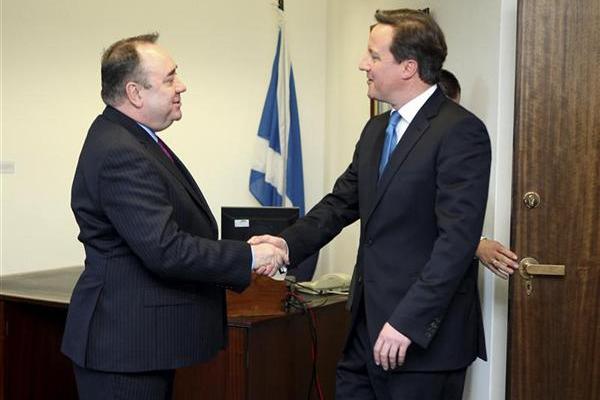
Scotland’s First Minister Alex Salmond (left) greets Britain’s Prime Minister David Cameron as he arrives for talks on a Scottish referendum on independence at St Andrews House in Edinburgh, Scotland in 2012.
‘Yes’ campaign made Westminster’s leaders scurry north in battle to retain 307-year union
On this monumental day in British history, as we wake up to learn whether Scotland’s four million plus voters have chosen to break a 307-year union or to continue as part of the United Kingdom, the lords, ladies and assorted MPs of Westminster will be biting their nails down to stubs.
At press time last night, early signs and polling were pointing to a “No” vote. But whether this turns out to be true, there is at least one certainty to be drawn from the referendum. Either way, British Prime Minister David Cameron has lost.
In what was considered to be a calculated political gamble, on 15 October, 2012, Cameron signed the “Edinburgh Agreement,” a document that paved the way for yesterday’s referendum. At the time, it was assumed that the UK and the union would breeze through the vote, but now, in retrospect, that decision looks to have been a major tactical error.
Some would argue the gamble was even more cynical than it seems at first glance — Cameron’s advisers would have told the PM that a “yes” vote would hurt Labour the most. Indeed, at the moment, the party holds 40 of the 59 Scottish-based seats in Westminster. Independence would severely weaken their ability to achieve a parliamentary majority in future elections.
For the Tories then, it was almost a win-win situation — a vote for independence would hurt Labour, a vote for the union would strengthen Cameron’s position. After all, it’s not like there’s a bastion of Conservative support north of the border to worry about losing. In 1979, one in three Scots were voting Tory, but dramatic societal changes, especially the decline in manufacturing and the subsequent rise in unemployment which came under Thatcherism, decimated Conservative support in the country.
The single opt-in/opt-out question (“Should Scotland be an independent country?”) also looks miscalculated, perhaps even arrogant. There is no doubt in most minds that a third “Devo Max” option, awarding extra powers to the Scottish Parliament, would likely have attracted the most votes, but the government insisted it be a simple, straight choice, thinking people would shy away from complete separation.
Salmond a winner
On the other side of the coin, SNP leader and Scotland’s First Minister Alex Salmond should feel a winner today, even if the “Yes” campaign falls short in the referendum.
For the SNP, today is the culmination of a process that, according to them, began centuries ago. In modern politics however, the party has been desperate for a referendum since at least 2007, although it wasn’t until 2011 that the party had the support to press for it fully.
Whatever the result, it’s a major victory for the SNP leader. His profile has been noticeably raised, his “Yes” campaign has been widely praised for politicising those who usually remain ignorant of governance. He’s seen all three major parties down in London panic, with them desperately rushing north of the border to promise greater devolution to Scots, especially in terms of setting taxation. Why not before? It’s amazing is that this promise only became a reality this week, in the face of surging support for a “Yes” vote.
That’s just one example of the depressingly negative campaign led by the “Better Together” group, which chose one of the greyest, most boring chancellor of the exchequers ever, Alastair Darling, to serve the government to lead its campaign. Months, years even to plan and only belatedly have they realised they’re in a fight. And their response? A flat-out bribe.
This vote has prompted a political awakening in Scotland’s ignored masses, especially the working-classes abandoned by Thatcherism and the young, some of whom have registered to vote for the first time in their lifetimes.
Already there is pressure from other regions in Britain watching Scotland win more powers — why shouldn’t they get devolution too? And the impact is not just limited to the UK — Europe is watching closely, especially those living in Catalonia. And a penny for Angela Merkel’s thoughts as she watches Westminster struggle — how do you think she feels Cameron would perform in a vote on a possible “Brexit” from the EU?
But what’s becoming increasingly clear is that the referendum is now not just about independence, and this is where Cameron should realise just how out of touch Britain’s political establishment is.
This vote has prompted a political awakening in Scotland’s ignored masses, especially the working-classes abandoned by Thatcherism and the young, some of whom have registered to vote for the first time in their lifetimes. It’s been wonderful to see so many people politically-engaged and motivated. And despite allegations of a brash, bullying culture within the “Yes” campaign against its opponents, such comments are, in the main, baffling. Did anyone really think it wouldn’t get emotional?
Clearly, the “Yes” campaign (and especially the optimistic tone it carries) was underestimated, as was the level of political engagement the vote would prompt among Scottish citizens. Voter registration is through the roof, turnout is expected to be more than 30 percent higher than that in the last general election. As The Guardian wrote yesterday, it’s been a “genuine national conversation that has reached the smallest town and the most remote rural community.”
Cameron asked voters this week not to break his heart by voting against the union. But he also insisted he would not resign in such a situation. Should Scotland decide that auld acquaintance should be forgot today, the PM may find he has less of a say in that matter than he thinks. The knives will be out.
@urlgoeshere
Originally published in the Buenos Aires Herald, on the morning of Friday, September 19, 2014
Link: http://www.buenosairesherald.com/article/170134/whatever-the-result-cameron-and-allies-lose.
